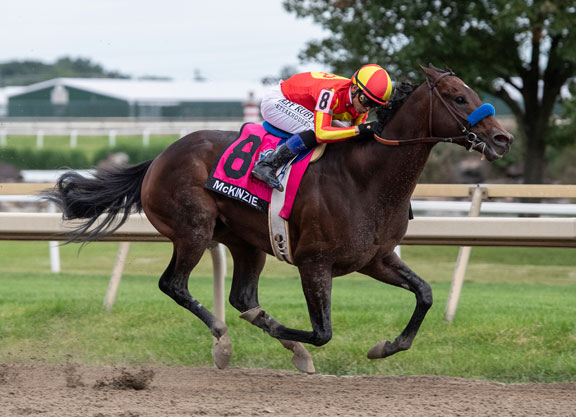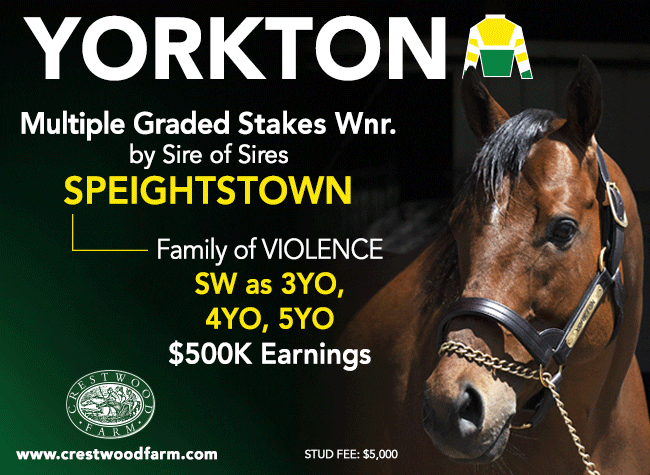By T. D. Thornton
The GI Pennsylvania Derby win by 'TDN Rising Star' McKinzie (Street Sense) was undoubtedly the headline-grabber of the weekend. Prior to being sidelined with an ankle injury in April, the Bob Baffert-trained bay had been perched firmly in the top tier of favorites for the GI Kentucky Derby, and Saturday's comeback win at Parx generated a preliminary Beyer Speed Figure of 107 and “incredible horse” praise from jockey Mike Smith for being able to score at nine furlongs off a half-year layoff.
But with the Breeders' Cup looming in six weeks, McKinzie's Pennsylvania Derby performance also raised several significant questions about whether or not we saw a winner who would loom as a serious threat in a race like the GI Classic at Churchill Downs. (The GI Dirt Mile could be another option, as might a later-season race like the GI Clark H. at Churchill Nov. 23.)
McKinzie's final clocking of 1:52.05 was the slowest in the 39-year history of the Pennsylvania Derby. He broke running, rated kindly, then got floated wide on the clubhouse turn as the jockeys in the first flight all avoided a perceived dead rail like the inside paths were strung with barbed wire. He settled for the backstretch run just to the outside of an ideal target: An 81-1 pacemaker loping along at a lethargic tempo (:48.91 for the opening half mile).
McKinzie responded to a mild drive and seized the lead on cue three-eights out, and with the other four entrants whose odds were below 10-1 all failing to fire, the 2-1 favorite was never seriously threatened in the run to the wire.
Thus, we didn't get to see a true heat-of-battle stretch test, which is important in assessing where McKinzie belongs in the overall pecking order.
In his first four career races, McKinzie didn't always look comfortable fighting late in the lane. He swished his tail in the stretch runs of his first three races when called upon for more aggression, and in his GII San Felipe S. disqualification he was bearing out while fully extended. Again in the Pennsylvania Derby, McKinzie flicked his tail four times in reaction to Smith's left-handed stick work.
Regardless of which race is chosen next for McKinzie, the only certainty is that it's bound to be a much tougher spot than his comeback race at Parx. Will he be up to the task?
Runner-up Axelrod (Warrior's Reward) continues to build on his reputation as an overachiever who consistently outruns long odds. He didn't compete in the Triple Crown races, but since June has racked up two Grade III wins and a pair of seconds in a Grade I and a Grade III stakes–all dirt routes after starting the year sprinting on the turf.
Hofburg (Tapit) could emerge as the Pennsylvania Derby participant with the best chance to shrug off a blah performance. His no-kick fourth as the second choice might have been hampered by being too far off a dawdling pace even though he was equipped with blinkers for the first time. He gave up plenty of real estate while parked wide for most of his trip, including a six-path middle move on the far turn that he could not sustain late into the lane.
Triple Crown Trivia
Heading into the final week of the baseball season, J.D. Martinez of the Boston Red Sox has an outside chance to rally late and win the sport's Triple Crown (he currently leads in runs batted in and is second in both home runs and batting average). In a historical sense, Martinez is also chasing Justify (Scat Daddy)'s sweep of the Triple Crown races earlier this spring. Can you name the last time that both baseball and horse racing produced Triple Crown winners in the same year? (Answer below.)
Insurmountable Odds are No Jackpot
Last week's news that The Stronach Group will be introducing a new bet to link the GI Pegasus World Cup with the just-announced GI Pegasus World Cup Turf Invitational is not surprising. But the mind-numbing mathematical magnitude of what's being billed as the “Pegasus Pick 24” left some people openly wondering if the announcement was for real.
Brace yourself, it's no joke: According to a Gulfstream Park press release, “The Pegasus Pick 24 will offer up the chance to bet on the exact finish order for both the Pegasus World Cup Invitational and the Pegasus World Cup Turf Invitational, adding another layer to the race-day excitement. A whopping $5 million bonus awaits the lucky fan who hits on the Pegasus Pick 24.”
Without taking into consideration the actual past-performance chances of individual horses, there are 479,001,600 possible finish-order combinations in a field of 12.
In order to win this wager, you not only have to overcome that 479 million-to-one (theoretical and rounded) proposition in the first leg, but then you must miraculously complete that exact same task in the second Pegasus leg.
To calculate the probability of selecting the exact order of finish in a 12-horse field twice on the same ticket, multiply 479 million by itself.
This pegs the theoretical chance (again, rounded) of winning the Pegasus Pick 24 at more than 229 quadrillion to one.
So scooping the bet's pari-mutuel pool, plus its $5 million advertised bonus, hardly seems like a “whopping” payday considering the astronomical odds involved. In fact, it's an absurd underlay for the investment and effort.
In an era when pari-mutuel venues should be doing everything they can to return more winnings to bettors so horseplayers don't get burned by the lack of churn, it's dismaying to see how strongly the “lottery mentality” has taken hold at the track management and racing commission levels.
The tantalizing prospect of betting a little to make a life-changing score is perceived as better/easier to market than the concept of making tangible tweaks to existing wagers so established, grind-it-out customers get more bang for their betting bucks.
In a similar vein, on Monday the New York State Gaming Commission (NYSGC) will discuss and possibly vote on allowing “jackpot” or “rainbow” pick six wagers at the state's Thoroughbred tracks.
According to a brief written by NYSGC general counsel Edmund Burns that was included in the informational packet for Monday's meeting, this type of bet “appeals to bettors by giving a larger prize when there is only one winning wager from a pool.”
That “appeal” is debatable. If it passes the preliminary vote, the jackpot concept should be challenged in its public commentary period by diehard traditional pick six players who see more value in sharing six-correct splits and five-correct consolation winnings rather than having that money accrue in a hard-to-claw-back carryover.
Past-Post Perceptions
Meanwhile, on the left coast, the California Horse Racing Board this Thursday will take up another oft-debated (and very legitimate) horseplayer complaint: Odds fluctuations that occur well after a race has started.
“One of the biggest perception challenges facing horse racing in North America is the problem of odds changing significantly after the start of a race,” reads the brief for this agenda item in the CHRB meeting packet. “The odds dropping on a winning horse just before the finish creates suspicion that someone bet on the horse after the start of the race. Although the CHRB has investigated dozens of complaints about late odds changes and determined in every instance that all wagers were legally placed before the start of the race, some bettors remain skeptical.”
The CHRB will discuss and possibly vote on a new rule to remedy this, which reads in draft form: “Any association, advance wagering provider, or other entity licensed by the Board to distribute the audiovisual signal of any California race shall post the final odds for that race on all displays within five seconds of the close of wagering.”
Trivia Answer
The last (and only) year that horse racing and baseball shared Triple Crown winners was 1937, when War Admiral and Joe Medwick of the St. Louis Cardinals both accomplished the feat.
Not a subscriber? Click here to sign up for the daily PDF or alerts.






